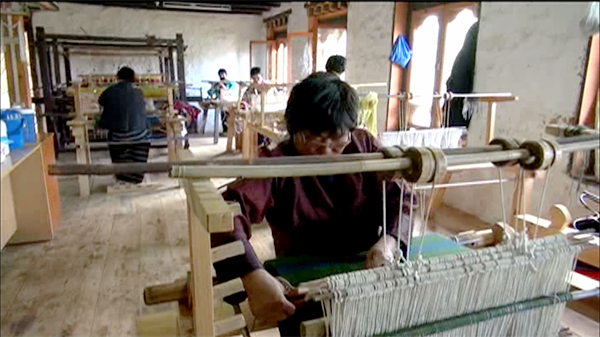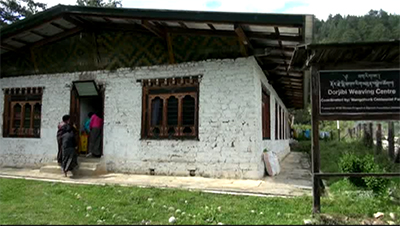 The Agency for Promotion of Indigenous Crafts’ (APIC) new product development training for women in Dorjibi Weaving Centre has come at a time when the centre has become dysfunctional and the morale of the weavers become low all due to the COVID-19 pandemic situation.
The Agency for Promotion of Indigenous Crafts’ (APIC) new product development training for women in Dorjibi Weaving Centre has come at a time when the centre has become dysfunctional and the morale of the weavers become low all due to the COVID-19 pandemic situation.
 The group is particularly hit hard by the situation, as they are entirely dependent on weaving for their livelihoods.
The group is particularly hit hard by the situation, as they are entirely dependent on weaving for their livelihoods.
Dorjibi Weaving Centre has remained closed for more than three months due to lack of yarn and dearth of buyers for their products. That is until trainers from APIC initiated a weeklong weaving training for the women in the centre. The centre has come alive in the last one week with weavers introduced to new colour combination ideas, hand stitching skills and new product development expertise among other lessons.
Ugyen Lhamo, the chairperson of Dorjibi Weaving Centre at Chhoekhor in Bumthang, says the training would help them in improving the standard of their products. “We have been idle for so long now. However, the training conducted by APIC has taught us natural dying and colour combination skills that are sought after in the international textile market. Hopefully, when the pandemic ends, we would be able to build on to the skills we have acquired and come up with new products and make our fabrics more attractive in the international market,” she said.
And Gorden, a member of the weaving centre shares her sentiments with the revival of hand stitching, “we already know how to weave Yathra fabrics but with this training, we have learnt how to come up with new fabric patterns. Moreover, we were also taught about the essence of hand stitching. I have never picked up hand stitching after I left it about 30 years ago since the advent of the sewing machine in the country. I felt quite nostalgic when we were taught about it during the training.”
Tshomo, also a member of the centre, says the training has helped them in the valuation of their products. “So far we used to estimate the prices of our products depending on the complexity of the fabric’s patterns. However, trainers have taught us about product costing and pricing techniques. We are now going to use them for pricing our products,” she added.
Among the participants were some college students. They said the training has helped them keep engaged.
“As the colleges have remained closed due to the pandemic, we have lots of off-hours during the daytime as we study only at night. So I took this opportunity to participate in the training. Here, all the households are almost entirely dependent on weaving for our source of income. Likewise, after graduation if I don’t get employed, I will join the centre and take up weaving as a fulltime job,” said Tshewang Choden, a student at the College of Natural Resources.
“I just completed class 12 and I am waiting for my first semester in college but then we have a 6-month long break in between. So I heard that there would be a weaving training about natural dyeing and hand stitching skills, so I joined it as well,” added Ugyen Choden, a student of Sherubtse College.
Along with other Bhutanese handicrafts and souvenirs, the products made at the training will be displayed at international textile exhibitions in the future through which marketing opportunities will be sought. The marketing activities will be supported by the International Trade Centre’s (ITC) EU-Bhutan Trade Support Project.
Karma Choden, the Manager for Cluster and Craft Bazaar Division under APIC, shares the market opportunity for the weaving centre in the coming years, “the EU-Bhutan Trade Support Project has facilitated APIC in marketing various Bhutanese handicrafts at an exhibition in Paris in January this year. Likewise, the products made by the Dorjibi weavers will also be taken for exhibition in the UK, US, Japan and France. So we are coming up with new products through such training.”
As a part of the training, another team from APIC conducted a five-day natural dyeing of sheep wool for the staff of the National Sheep Breeding Centre at Dungbithang with other local participants.
Kipchu












